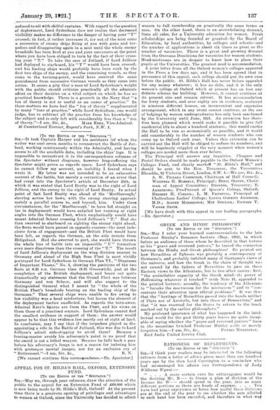GREEK AND HINDU PHILOSOPHY [To THE EDITOR OF THE "
SPECTATOR."1 Sia,—May I refer your learned controversialists to the late Professor Huxley's Romanes Lecture (May, 1893), in which before an audience of those whom he described in that lecture as his " grave and reverend juniors," he traced the connexion between the Hindu and Greek philosophies? He pointed out how Heraclitus of Ephesus was probably a contemporary of Gautama's, and probably imbibed many of Gautama's views of the universe, and how the break in the chain of thought was not caused by the failure of Heraclitua to pass on these Eastern views to the Athenians, but to two other causes : first, "the assimilative capacity of the Greek mind—its power of Hellenizing whatever it touched" (vide Note 11, appended to the printed lecture); secondly, the tendency of the Athenians to " forsake the macrocosm for the microcosm " and to "con- centrate their attention upon ethical problems." It was thus that the "heritage of Heraclitus passed into the hands neither of Plato nor of Aristotle, but into those of Democritue," and that " it was reserved for the Stoics to return to the track marked out by the earlier philosophers."
My profound ignorance of what has happened in the intel- lectual world for the past thirty years leaves me quite incap- able of saying whether the "grave and reverend juniors" have in the meantime brushed Professor Huxley aside or merely


































 Previous page
Previous page